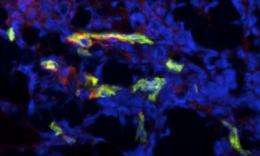Targeting cancerous vessels

By lowering the level of a neuronal protein, researchers halted the growth of blood vessels that tumors rely on for survival. The findings are reported online in the Journal of Experimental Medicine on Jan. 4.
Formerly known for its effects on neuronal growth, the team found that the protein {delta}-catenin is also produced by cells in human blood vessels. By diminishing {delta}-catenin expression, the team disrupted vessel development, or angiogenesis, associated with inflammation in tumors and wounds. As expected, samples of human lung tumors expressed more {delta}-catenin than the surrounding tissues. And normal angiogenesis remained the same regardless of {delta}-catenin.
Because blocking {delta}-catenin stunts only inflammation-induced angiogenesis, the protein may be a promising anti-cancer target, says Charles Lin, an author on the study at Vanderbilt University Medical Center in Tennessee.
More information: DeBusk, L.M., et al. 2010. J. Exp. Med. doi:10.1084/jem.20091097















